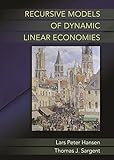Recursive Models of Dynamic Linear Economics Hansen, Lars Peter
Material type: TextPublication details: Princeton and Oxford Princeton University Press 2014Description: xv, 399p. Includes bibliographyISBN:
TextPublication details: Princeton and Oxford Princeton University Press 2014Description: xv, 399p. Includes bibliographyISBN: - 9780691180731
- X:(B) Q4
| Item type | Current library | Home library | Call number | Status | Barcode | |
|---|---|---|---|---|---|---|
 Textbook
Textbook
|
Ratan Tata Library | Ratan Tata Library | X:(B) Q4 (Browse shelf(Opens below)) | Available | RT1528320 |
A common set of mathematical tools underlies dynamic optimization, dynamic estimation, and filtering. In Recursive Models of Dynamic Linear Economies, Lars Peter Hansen and Thomas Sargent use these tools to create a class of econometrically tractable models of prices and quantities. They present examples from microeconomics, macroeconomics, and asset pricing. The models are cast in terms of a representative consumer. While Hansen and Sargent demonstrate the analytical benefits acquired when an analysis with a representative consumer is possible, they also characterize the restrictiveness of assumptions under which a representative household justifies a purely aggregative analysis.
There are no comments on this title.

